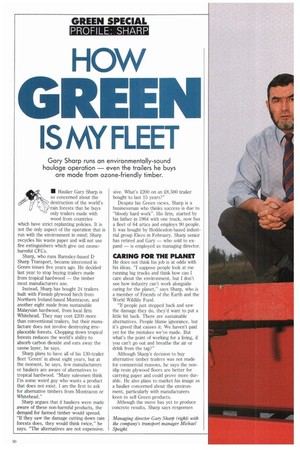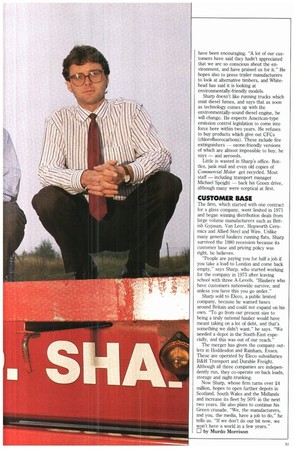Gi OW i t I EN
Page 50

Page 51

If you've noticed an error in this article please click here to report it so we can fix it.
IS MY FLEET
• Haulier Gary Sharp is so concerned about the destruction of the world's rain forests that he buys only trailers made with wood from countries which have strict replanting policies. It is not the only aspect of the operation that is run with the environment in mind; Sharp recycles his waste paper and will not use fire extinguishers which give out ozoneharmful CFCs.
Sharp, who runs Barnsley-based D Sharp Transport, became interested in Green issues five years ago. He decided last year to stop buying trailers made from tropical hardwood — the timber most manufacturers use.
Instead, Sharp has bought 24 trailers built with Finnish plywood birch from Northern Ireland-based Montracon, and another eight made from sustainable Malaysian hardwood, from local firm Whitehead. They may cost 2200 more than conventional trailers, but their manufacture does not involve destroying irreplaceable forests. Chopping down tropical forests reduces the world's ability to absorb carbon dioxide and eats away the ozone layer, he says.
Sharp plans to have all of his 130-trailer fleet "Green in about eight years, but at the moment, he says, few manufacturers or hauliers are aware of alternatives to tropical hardwood. "Many salesmen think I'm some weird guy who wants a product that does not exist. I am the first to ask for alternative timbers from Montracon or Whitehead."
Sharp argues that if hauliers were made aware of these non-harmful products, the demand for fanned timber would spread. "If they saw the damage cutting down rain forests does, they would think twice," he says. "The alternatives are not expensive. sive. What's 2200 on an 28,500 trailer bought to last 15 years?"
Despite his Green views, Sharp is a businessman who thinks success is due to "bloody hard work". His firm, started by his father in 1964 with one truck, now has a fleet of 64 artics and employs 90 people. It was bought by Hoddesdon-based industrial group Flee° in February. Sharp senior has retired and Gary — who sold to expand — is employed as managing director.
CARING FOR THE PLANET
He does not think his job is at odds with his ideas. "I suppose people look at me running big trucks and think how can I care about the environment, but I don't see how industry can't work alongside caring for the planet," says Sharp, who is a member of Friends of the Earth and the World Wildlife Fund.
"If people just stepped back and saw the damage they do, they'd want to put a little bit back. There are sustainable alternatives. People blame ignorance, but it's greed that causes it. We haven't paid yet for the mistakes we've made. But what's the point of working for a living, if you can't go out and breathe the air or drink from the tap?"
Although Sharp's decision to buy alternative timber trailers was not made for commercial reasons, he says the nonslip resin plywood floors are better for carrying paper and could prove more durable. He also plans to market his image as a haulier concerned about the environment, particularly with manufacturers keen to sell Green products.
Although the move has yet to produce concrete results, Sharp says responses have been encouraging. "A lot of our customers have said they hadn't appreciated that we are so conscious about the environment, and have praised us for it." He hopes also to press trailer manufacturers to look at alternative timbers, and Whitehead has said it is looking at environmentally-friendly models.
Sharp doesn't like running trucks which emit diesel fumes, and says that as soon as technology comes up with the environmentally-sound diesel engine, he will change. He expects American-type emission control legislation to come into force here within two years. He refuses to buy products which give out CFCs (chlorofluorocarbons). These include fire extinguishers ozone-friendly versions of which are almost impossible to buy, he says — and aerosols.
Little is wasted in Sharp's office. Bottles, junk mail and even old copies of Commercial Motor get recycled. Most staff — including transport manager Michael Speight — back his Green drive, although many were sceptical at first.
CUSTOMER BASE
The firm, which started with one contract for a glass company, went limited in 1971 and began winning distribution deals from large volume manufacturers such as British Gypsum, Van Leor, Hepworth Ceramics and Allied Steel and Wire. Unlike many general hauliers running flats, Sharp survived the 1980 recession because its customer base and pricing policy was right, he believes.
"People are paying you for half a job if you take a load to London and come back empty," says Sharp, who started working for the company in 1975 after leaving school with three A-Levels. "Hauliers who have customers nationwide survive, and unless you have this you go under."
Sharp sold to Eleco, a public limited company, because he wanted bases around Britain and could not expand on his own. "To go from our present size to being a truly national haulier would have meant taking on a lot of debt, and that's something we didn't want," he says. "We needed a depot in the South-East especially, and this was out of our reach."
The merger has given the company outlets in Hoddesdon and Rainham, Essex. These are operated by Eleco subsidiaries B&H Transport and Durable Freight. Although all three companies are independently run, they co-operate on back loads, storage and night-trunking.
Now Sharp, whose firm turns over £4 million, hopes to open further depots in Scotland, South Wales and the Midlands and increase its fleet by 50% in the next two years. He also plans to continue his Green crusade. "We, the manufacturers, and you, the media, have a job to do," he tells us. "If we don't do our bit now, we won't have a world in a few years." El by Murdo Morrison














































































































